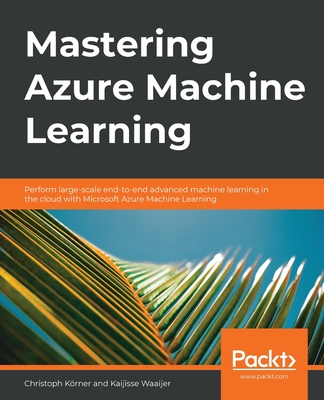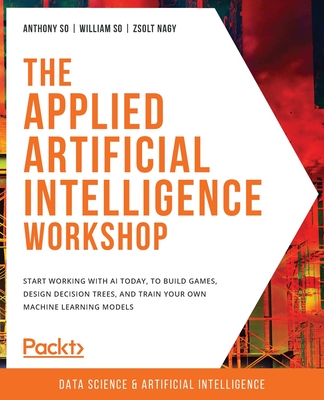Automated Machine Learning with Microsoft Azure: Build highly accurate and scalable end-to-end AI solutions with Azure AutoML
暫譯: 使用 Microsoft Azure 的自動化機器學習:構建高準確度和可擴展的端到端 AI 解決方案與 Azure AutoML
Sawyers, Dennis Michael
- 出版商: Packt Publishing
- 出版日期: 2021-04-23
- 售價: $1,990
- 貴賓價: 9.5 折 $1,891
- 語言: 英文
- 頁數: 340
- 裝訂: Quality Paper - also called trade paper
- ISBN: 1800565313
- ISBN-13: 9781800565319
-
相關分類:
Microsoft Azure、JVM 語言、人工智慧、Machine Learning
海外代購書籍(需單獨結帳)
買這商品的人也買了...
-
 嵌入式系統設計實務-電路與驅動程式
嵌入式系統設計實務-電路與驅動程式$250$225 -
 Using SQLite (Paperback)
Using SQLite (Paperback)$2,100$1,995 -
 ASP.NET 本質論
ASP.NET 本質論$520$364 -
 $700Professional Scrum Development with Microsoft Visual Studio 2012 (Paperback)
$700Professional Scrum Development with Microsoft Visual Studio 2012 (Paperback) -
 Raspberry Pi 使用者手冊 (Raspberry Pi User Guide)
Raspberry Pi 使用者手冊 (Raspberry Pi User Guide)$580$522 -
 SQL Server 效能調校
SQL Server 效能調校$450$351 -
 Beginning Big Data with Power BI and Excel 2013: Big Data Processing and Analysis Using PowerBI in Excel 2013 (Paperback)
Beginning Big Data with Power BI and Excel 2013: Big Data Processing and Analysis Using PowerBI in Excel 2013 (Paperback)$1,600$1,520 -
 $403系統分析與設計:敏捷迭代方法(原書第6版)
$403系統分析與設計:敏捷迭代方法(原書第6版) -
 IoT Solutions in Microsoft's Azure IoT Suite: Data Acquisition and Analysis in the Real World
IoT Solutions in Microsoft's Azure IoT Suite: Data Acquisition and Analysis in the Real World$3,330$3,164 -
 $958深度學習
$958深度學習 -
 演算法之美:隱藏在資料結構背後的原理 (C++版)
演算法之美:隱藏在資料結構背後的原理 (C++版)$650$507 -
 $454JSON 實戰
$454JSON 實戰 -
 $305大數據技術
$305大數據技術 -
 Mastering Azure Machine Learning
Mastering Azure Machine Learning$1,990$1,891 -
 手機攝影必學 BOOK:用OX帶你學會拍人物、食物、風景等情境照片
手機攝影必學 BOOK:用OX帶你學會拍人物、食物、風景等情境照片$398$299 -
 創意競擇:從賈伯斯黃金年代的軟體設計機密流程,窺見蘋果的創意方法、本質與卓越關鍵
創意競擇:從賈伯斯黃金年代的軟體設計機密流程,窺見蘋果的創意方法、本質與卓越關鍵$460$391 -
 Web 開發者一定要懂的駭客攻防術 (Web Security for Developers: Real Threats, Practical Defense)
Web 開發者一定要懂的駭客攻防術 (Web Security for Developers: Real Threats, Practical Defense)$420$332 -
 資料科學的統計實務 : 探索資料本質、扎實解讀數據,才是機器學習成功建模的第一步
資料科學的統計實務 : 探索資料本質、扎實解讀數據,才是機器學習成功建模的第一步$599$473 -
 Martin Fowler 的企業級軟體架構模式:軟體重構教父傳授 51個模式,活用設計思考與架構決策 (Patterns of Enterprise Application Architecture)
Martin Fowler 的企業級軟體架構模式:軟體重構教父傳授 51個模式,活用設計思考與架構決策 (Patterns of Enterprise Application Architecture)$800$624 -
 我懂了!專案管理 (暢銷紀念版)
我懂了!專案管理 (暢銷紀念版)$400$316 -
 電腦視覺機器學習實務|建立端到端的影像機器學習 (Practical Machine Learning for Computer Vision: End-To-End Machine Learning for Images)
電腦視覺機器學習實務|建立端到端的影像機器學習 (Practical Machine Learning for Computer Vision: End-To-End Machine Learning for Images)$780$616 -
 機器人傳感器
機器人傳感器$408$388 -
 Learning Blazor: Build Single-Page Apps with Webassembly and C# (Paperback)
Learning Blazor: Build Single-Page Apps with Webassembly and C# (Paperback)$2,185$2,070 -
 無瑕的程式碼 軟體工匠篇:程式設計師必須做到的紀律、標準與倫理 (Clean Craftsmanship: Disciplines, Standards, and Ethics)
無瑕的程式碼 軟體工匠篇:程式設計師必須做到的紀律、標準與倫理 (Clean Craftsmanship: Disciplines, Standards, and Ethics)$720$562 -
 從源頭就優化 - 動手開發自己的編譯器實戰
從源頭就優化 - 動手開發自己的編譯器實戰$880$695
商品描述
A practical, step-by-step guide to using Microsoft's AutoML technology on the Azure Machine Learning service for developers and data scientists working with the Python programming language
Key Features:
- Create, deploy, productionalize, and scale automated machine learning solutions on Microsoft Azure
- Improve the accuracy of your ML models through automatic data featurization and model training
- Increase productivity in your organization by using artificial intelligence to solve common problems
Book Description:
Automated Machine Learning with Microsoft Azure helps you to build high-performing, accurate machine learning models in record time. It allows anyone to easily harness the power of artificial intelligence and increase the productivity and profitability of your business. With a series of clicks on a guided user interface (GUI), novices and seasoned data scientists alike can train and deploy machine learning solutions to production with ease.
This book will teach you how to use Azure AutoML with both the GUI as well as the AzureML Python software development kit (SDK) in a careful, step-by-step way. First, you'll learn how to prepare data, train models, and register them to your Azure Machine Learning workspace. You'll then discover how to take those models and use them to create both automated batch solutions using machine learning pipelines and real-time scoring solutions using Azure Kubernetes Service (AKS). Finally, you will be able to use AutoML on your own data to not only train regression, classification, and forecasting models but also use them to solve a wide variety of business problems.
By the end of this Azure book, you'll be able to show your business partners exactly how your ML models are making predictions through automatically generated charts and graphs, earning their trust and respect.
What You Will Learn:
- Understand how to train classification, regression, and forecasting ML algorithms with Azure AutoML
- Prepare data for Azure AutoML to ensure smooth model training and deployment
- Adjust AutoML configuration settings to make your models as accurate as possible
- Determine when to use a batch-scoring solution versus a real-time scoring solution
- Productionalize your AutoML solution with Azure Machine Learning pipelines
- Create real-time scoring solutions with AutoML and Azure Kubernetes Service
- Discover how to quickly deliver value and earn business trust using AutoML
- Train a large number of AutoML models at once using the AzureML Python SDK
Who this book is for:
Data scientists, aspiring data scientists, machine learning engineers, or anyone interested in applying artificial intelligence or machine learning in their business will find this book useful. You need to have beginner-level knowledge of artificial intelligence and a technical background in computer science, statistics, or information technology before getting started with this machine learning book. Familiarity with Python will help you implement this book's more advanced features, but even data analysts and SQL experts will be able to train ML models after finishing this book.
商品描述(中文翻譯)
一個實用的逐步指南,教導開發人員和數據科學家如何在 Azure Machine Learning 服務上使用微軟的 AutoML 技術,並使用 Python 程式語言。
主要特點:
- 在 Microsoft Azure 上創建、部署、實現生產化和擴展自動化機器學習解決方案
- 通過自動數據特徵化和模型訓練來提高您的機器學習模型的準確性
- 通過使用人工智慧解決常見問題來提高您組織的生產力
書籍描述:
《使用 Microsoft Azure 的自動化機器學習》幫助您在創紀錄的時間內構建高效能、準確的機器學習模型。它使任何人都能輕鬆利用人工智慧的力量,並提高您業務的生產力和盈利能力。通過在引導用戶界面 (GUI) 上的一系列點擊,無論是新手還是經驗豐富的數據科學家,都可以輕鬆地訓練和部署機器學習解決方案到生產環境中。
本書將教您如何以謹慎的逐步方式使用 Azure AutoML,無論是透過 GUI 還是 AzureML Python 軟體開發工具包 (SDK)。首先,您將學習如何準備數據、訓練模型並將其註冊到您的 Azure Machine Learning 工作區。接著,您將發現如何利用這些模型來創建自動化批次解決方案,使用機器學習管道以及使用 Azure Kubernetes Service (AKS) 的即時評分解決方案。最後,您將能夠在自己的數據上使用 AutoML,不僅訓練回歸、分類和預測模型,還能用它們來解決各種商業問題。
在這本 Azure 書籍結束時,您將能夠向您的商業夥伴清楚展示您的機器學習模型如何通過自動生成的圖表和圖形進行預測,贏得他們的信任和尊重。
您將學到的內容:
- 理解如何使用 Azure AutoML 訓練分類、回歸和預測的機器學習演算法
- 準備數據以確保 Azure AutoML 的模型訓練和部署順利進行
- 調整 AutoML 配置設置,使您的模型盡可能準確
- 確定何時使用批次評分解決方案與即時評分解決方案
- 使用 Azure Machine Learning 管道將您的 AutoML 解決方案實現生產化
- 使用 AutoML 和 Azure Kubernetes Service 創建即時評分解決方案
- 發現如何快速交付價值並利用 AutoML 贏得商業信任
- 使用 AzureML Python SDK 同時訓練大量 AutoML 模型
本書適合對象:
數據科學家、渴望成為數據科學家的專業人士、機器學習工程師,或任何有興趣在其業務中應用人工智慧或機器學習的人都會發現本書有用。在開始閱讀這本機器學習書籍之前,您需要具備初級的人工智慧知識以及計算機科學、統計學或資訊技術的技術背景。熟悉 Python 將有助於您實現本書的更高級功能,但即使是數據分析師和 SQL 專家在完成本書後也能夠訓練機器學習模型。

















![AJAX y PHP: Construyendo Aplicaciones Web Interactivas [Espanol] (Spanish Edition)-cover](https://cf-assets2.tenlong.com.tw/products/images/000/113/835/medium/51HMbf3MB6L.jpg?1525604300)










